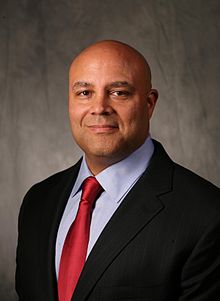
Powell
You and I may think America can do better providing fast and inexpensive broadband service. But a former chairman of the FCC now representing industry interests waved shiny keys of distraction to explain away why cable companies are still delivering Internet speeds slower than those found in Romania, Latvia, South Korea and Japan.
Michael Powell, the poster child of D.C.’s “revolving door” problem gave a well-compensated, rousing (yet fact-lacking) defense of an industry he was supposed to oversee in the public interest as the Bush Administration’s FCC chairman from 2001-2005.
“America is home to the world’s very best Internet companies,” said Michael Powell, chief executive of the National Cable and Telecommunications Assn. at the annual Cable Show in Washington, D.C. “We have worked hard to reach everyone, and now offer service to 93% of American homes. Despite our success, many people like to denigrate U.S. broadband by painting false comparisons to other countries. There are some nations doing very well, but it is foolish to compare countries like Latvia and France to the United States of America.”
Powell’s response is hardly a fact-filled defense for cable company broadband that still delivers slow speeds at high prices. Instead of attempting to call the statistics inaccurate, he tried to explain away the discrepancy by complaining people are ignoring the size of the country and its population.

In denial
Powell’s arguments might have some merit if the cable industry did not make a point of bypassing vast rural areas that do not meet Return on Investment tests. It is difficult to claim cable companies cannot deliver comparatively fast service in rural Iowa when they don’t offer any service at all.
The People’s Republic of China’s population is far larger than our own and is now a vital market for fiber optics manufacturers and suppliers. While some of America’s cable industry CEOs repeatedly argue America does not need fiber broadband or gigabit broadband speeds, the Chinese government has insisted that every new housing development be pre-wired with fiber that will easily and inexpensively supply those speeds in the near future.
Powell is correct to say speeds are improving in the United States, but there is growing evidence they are improving even faster overseas, especially in countries that are basing their primary telecommunication infrastructure on fiber optics, which can support enormously fast Internet speeds. As those fiber networks are lit, America will fall even faster in broadband rankings as long as cable operators continue to insist there is no demand or interest in the next generation of high-speed service. At the prices they charge, they may just prove their own “no demand”-argument, at least in this country.
Powell himself helped lay the foundation for America’s broadband duopoly by deregulating the industry with one hand while ignoring the need for competitive checks and balances with the other. At the end of Powell’s tenure, his greatest achievement was constructing an industry-friendly personal resumé to win lucrative employment as a telecommunications lobbyist.
Who better to speak with “authority” on telecommunications matters than a well-connected former FCC chairman that does the industry’s bidding? The NCTA hired him to deliver just the kind of defense cable operators hope Americans will believe.
Those that are aware of what broadband is like abroad don’t.


 Subscribe
Subscribe
Everytime I see ad saying,they want new customers.They don’t know how to get them.They talk expandion,that means update services,that should be updated every year with their own money,not money they get off government,us.When they should be figuring out,how to get to people,that don’t have cable.Government money suppost to go for people to get cheap broadband to people,that can’t get.Everything they have now,satellite and wireless internet don’t do good at all,in alot of areas and isn’t cheap or good services,and don’t get the GB’s.The valued needs to be taken of valued customers,they need to put valued big companies.Companies think money,when people… Read more »
He was amazing as FCC chair and you are right, he was building his resume, each group he talked to would think they were his key focus….cable won the bid…shamefull that USA allows regulators to work for the very people they regulate and now vice versa. Australia, UK, some EU and other Asia regulators laugh at us…those very countries are indeed leaping over us. Time will tell and the citizens of those countries will benefit….
Your right other countries are leaven the usa behind.When usa please companies and leaves the customers behind.And charter is getting faster,but leaving customers behind that can’t get cable.And USA saying they are doing something for the people access to broadband and cheaper.They are not,for the USA,companies and money come first.